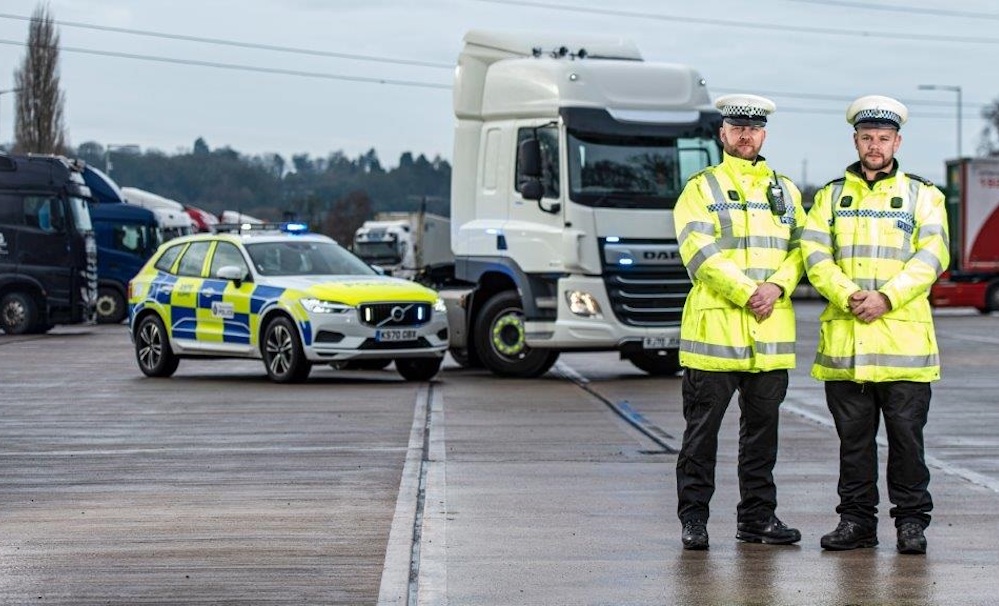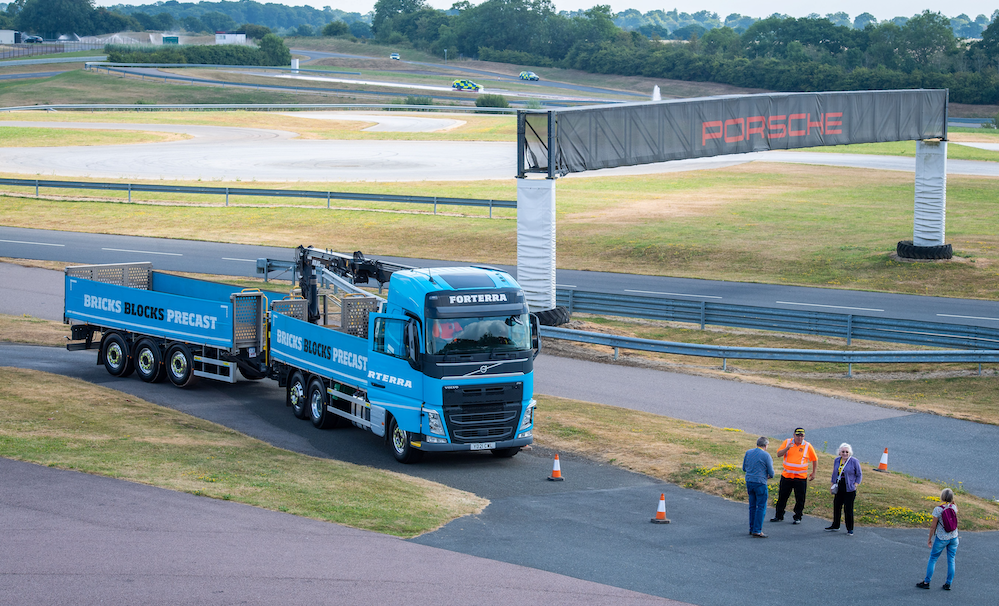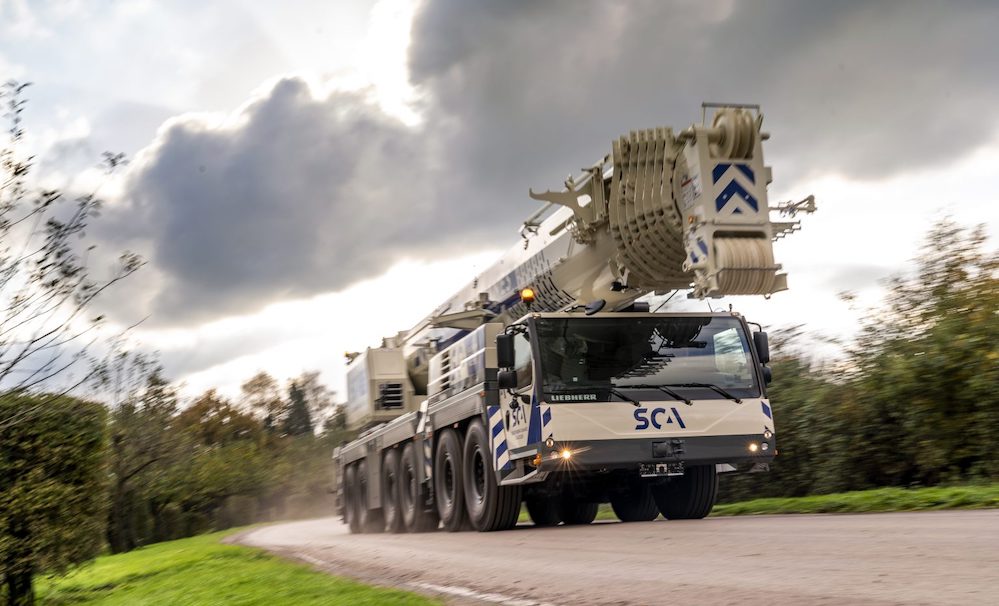Warwickshire Road Safety Partnership including Warwickshire Police’s Commercial Vehicle Unit has put its full support behind an Open Letter to industry regarding load security. The Open Letter has the support of over 30 police forces, National Highways, the DVSA and the Office of the Traffic Commissioner and asks commercial vehicle operators and drivers to play their part in reducing death and injury on our roads by making sure that all loads are secure and vehicles with loads are safe and legal before they set off.
In Warwickshire between January 2017 and August 2021, 986 straps, 1144 tyres and 64 shed loads have been recovered along with 5386 other obstructions on the county’s road network including the M6, M40, M42 and major A roads such as the A5, A45 and A46.
Carl Stafford of Warwickshire Police Commercial Vehicle Unit said “Commercial vehicles are currently overrepresented in road traffic collision statistics. For this to change we urgently need drivers, vehicle operators, and those loading vehicles or trailers for others to play their part in preventing deaths and injuries on our roads.
“Sadly we see the results of insecure loads falling from vehicles and killing or seriously injuring innocent people as part of our role. This is totally preventable and totally unacceptable. We are asking commercial vehicle drivers to do regular walk around checks of their vehicles every time they get into them to check straps and loads are safe and properly secured. We are also asking drivers to do additional checks on their load when they stop for tacho breaks to ensure their straps and chains have not come loose during transit. This could save someone’s life.
“We will continue to patrol the county’s roads during operations such as Safer Loads and Operation Tramline, looking for these dangerous vehicles and as well as issuing Traffic Offence Reports and preventing vehicles moving until loads are made secure, will refer drivers and companies to the Traffic Commissioner for further action to be considered.“
National Highways Assistant Regional Safety Co-ordinator, Marie Biddulph, said:
“Anyone carrying a load, whether a commercial or private vehicle, has a responsibility to make sure that load is properly secured. Unsafe vehicles are a threat to all road users.
“We know that carrying out simple safety checks on vehicle loads can prevent devastating tragedies, which is why we have signed this open letter alongside our safety partners urging all drivers to make sure their load is properly secured every time they get behind the wheel.
“Before setting off, drivers need to be confident that their vehicle is appropriate for the load being carried, that it is not overloaded and has been loaded properly, using the appropriate securing system. The consequences of not doing those checks could be fatal.”
The Open Letter is part of a national week of action that aims to improve the safety of commercial vehicles using our roads. During the week, Warwickshire Road Safety Partnership will be promoting road safety messages aimed at the commercial vehicle sector.
Further information:
In 2020, there were 12,140 items dropped or left on the National Highways’ network of motorways and major A roads in the Midlands including 1,400 tyres and 1,437 straps.
The Open Letter in full can be seen below
Nobody goes to work to intentionally harm or kill someone, but the reality is that unless you make sure the loads you carry are safe you are putting yourself and other people at risk during your journey and when you come to unload.
Any item capable of being thrown from or bouncing out of a vehicle needs to be secured whatever vehicle it is being carried on, whether it’s a plastic bucket or wheelbarrow, steel beams or heavy plant equipment. Even small items can kill or seriously injure someone if they come off a vehicle at speed. Delays and disruption on the road network because of load debris cost the UK economy millions of pounds every year.
Load shift incidents on the road and in the workplace are both foreseeable and completely preventable. Police forces, the Driver & Vehicle Standards Agency (DVSA) and National Highways are working together to protect people, but we can’t do it alone. Drivers, vehicle operators, and those loading vehicles or trailers for others (consignors) must also play their part in preventing deaths and injuries.
There is no excuse for sending dangerous vehicles onto the road network and putting people at risk. Appropriate enforcement action will be taken where individuals and companies are found to have recklessly broken the law.
The Road Traffic Act 1988 and the Road Vehicles (Construction & Use) Regulations 1986 say you must make sure that anything transported on or in a vehicle or trailer is secured so that it does not move during the journey and put people at risk. The Health & Safety at Work Act 1974 says that employers and the self-employed whose work puts others at risk must take steps to protect both their own employees and anyone else who could be at risk. Everyone has responsibilities to make sure that the load is safe and it’s not enough to simply assume the driver is the only responsible party once the vehicle leaves your site or rely on not having had something go badly wrong before.
· If you operate vehicles or load vehicles for other people, you must take steps to protect the driver, other road users, pedestrians, and anyone involved in loading or unloading. You must make sure drivers and people loading vehicles have the right training, information, and equipment to do their jobs safely. It is not enough to assume that the driver will make it right and your legal responsibilities do not end when the vehicle leaves your site.
· If you drive vehicles, make sure you know what you need to do. Challenge poor practice in the workplace where you can and ask for training if you are asked to take something out and you are not sure how it should be secured. Don’t assume it will be ok just because you’ve always done it that way. Check your securing equipment every time you use it and don’t use damaged equipment.
Free load security guidance is available from DVSA and free workplace transport guidance and resources to help you assess risk are available from HSE. Other guidance from National Highways, industry associations, and trade unions is also available to help you make sure you’re operating safely.
We all want our roads to be safe as possible and we all want to go home safely at the end of the working day. Play your part by making sure that everything you carry is secured and the vehicles you load are safe and legal before they set off.
Load securing: vehicle operator guidance – GOV.UK
HSE: Information about health and safety at work








